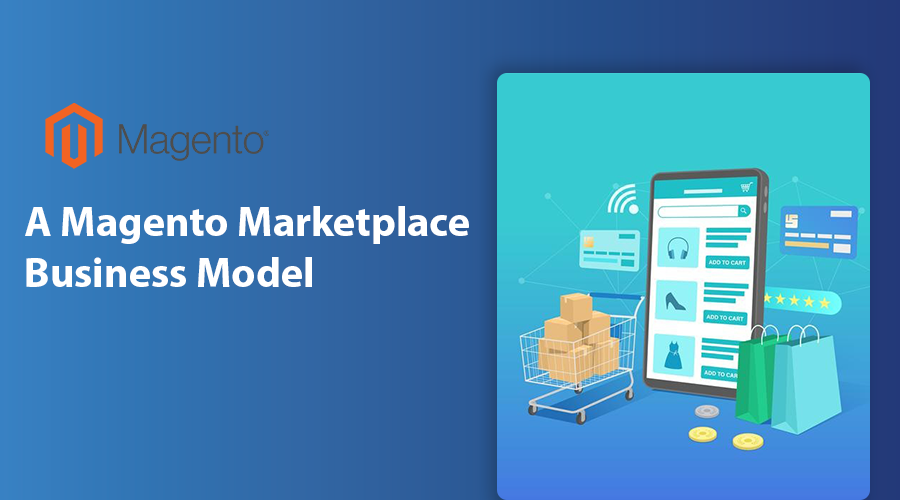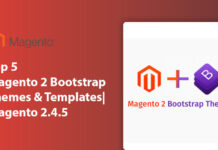
The proper backend is vital for launching and maintaining an online store, processing orders, and interacting with your customers. And you do not even need to engage a developer to create a website because the market has been flooded with solutions such as Magento Marketplace Business Models for everyone.
That’s why it’s worth taking a responsible approach to choosing a content management system for your trading site.
Today, the owner of a small or medium-sized business can easily find an eCom platform that meets his/her expectations in terms of costs, functionality, settings, security, etc. Magento is an open-source CMS, which offers a wide range of services aimed at ambitious eCommerce projects. In this article, we will take a look at it in more detail, and consider how to conduct market research, choose a business model, think through basic operations, build, launch, and develop your site.

Table of Contents
I. A Unique CMS for Ecommerce
Magento is a powerful open-source CMS. The advantage of such systems is that every Magento Marketplace business can contribute to the development of the product. The flexibility of such systems allows users to extend the functionality on their own or hire external specialists. Moreover, as a community member, you can get instant answers to all your questions in forums dedicated to the platform’s intricacies. By the way, the Magento community of developers around the world is already more than 300 thousand. They maintain and develop the platform and are always ready to answer any questions.
Magento offers two main packages for users. Free Magento open-source is better known as a community edition. It is designed to meet the basic needs of e-commerce businesses. Small business owners can create a website with simple online store functionality that is easy to launch and customize.
Open-source version features include:
- Built-in validation;
- Payment and shipping tools;
- Mobile shopping;
- Management of multiple stores;
- Order management;
- Tax management;
- Customer and customer group management, etc.
In addition, users can improve the functionality of the free version with extensions from the Magento marketplace.
At the same time, another package, Magento Commerce, is a universal solution. This is considered an easy method to use, and it has a wide range of features. Compared to the Open-Source version, the Magento Marketplace comes bundled with advanced features and tools, such as professional reporting and analysis dashboards, improved customer search solution, page rebuilder, optimized cloud hosting, customer support, and much more. And for those who want to try the advanced features of Magento Commerce, a free 30-day period is available.

The Magento Marketplace platform has a lot of features:
- Business analysis and statistics tools. Vendors get a better understanding of their customer base, identify key products, and share the results with their team and stakeholders;
- Smart shipping options. Magento Shipping solution is based on Temando, uses an API and microservice technology for easy installation, configuration settings, and third-party integrations;
- Cloud hosting. The open-source version requires users to find their own hosting provider, while the commercial version already includes cloud hosting solutions;
- Extension Marketplace. You can add more features to their basic Magento plan by purchasing popular extensions available on the platform;
- Easy catalog management;
- Smart catalog management;
- Scalability. Even if you’re just experimenting with Magento, you can be sure that if your business starts to grow many times faster, Magento always has something to offer.
If you take a look at usage statistics, you can see that Magento is one of the most popular content management systems. Figures show that about 12,500 websites today are powered by Magento. In 2021, the popularity of this CMS is continuing to grow vigorously.
This is How to add CMS Page Magento 2, which you can reference to install for your webshop.
II. How Is Magento Marketplace Business Module Worth in 2023?
This year, 62.5% of the world’s online spending was done through marketplaces. Just imagine, that’s more than half of all sales in the world! According to a study by Data Insight, marketplaces have become the fastest-growing sales channel in 2020. The growth of online commerce has been impacted by the pandemic: in the first three months of lockdown, more than 10 million shoppers began ordering items online. To meet the demand, Magento Marketplace Extensions are the priority for web stores to start offering subscriptions on products to help increase the lifetime value of their customers.
Уou also use the Magento marketplace platform from best providers to shop, book tickets, rent a car, and more. ECommerce is creeping into our lives more and more. So, it makes sense to ride that wave in 2022.
Also, a positive aspect is the effect of a network structure of Magento Marketplace. It helps you scale your business and avoid many of the costs. This is a great opportunity to quickly increase the reach of your business without the additional investment. One more important point of running this type of business is protecting the owner’s personal finances and separating them from corporate assets.

III. What to Consider Before Opening an Magento Marketplace Business
3.1. Market Research and Evaluation
According to CBInsights, “lack of demand” is what causes most businesses to fail at the beginning of their journey. That’s why it’s important to research and evaluate the market before you begin developing a marketplace. Getting started without doing so is a path to failure, not development.
No matter what popular niche you choose, you will have competitors. It is important to study them, their business models, the structure of the market as a whole, as well as its dynamics. Later, you will be able to use this data to build a successful strategy for the promotion and development of your business.
3.2. Identifying Your Target Audience
First of all, ask yourself basic questions:
- Who are my customers?
- What are their needs and problems?
- How can I help solve them?
- Why are they buying?
- What influences their buying decision?
Also, don’t forget to think about the salespeople who will be working on your Magento Marketplace.
- How can I help improve the sellers’ experience on Magento Marketplace?
- What other platforms are they using?
- What features are they missing?
- How can I increase customer flow and sales?
And Magento Marketplace Business Module can be considered to apply these needs.

3.3. Mageto Marketplace Business Model
When using the Magento Marketplace model for business can help a description of how a business makes money. It explains how you create a profitable customer experience at an appropriate price.
The business model is structured in three parts:
- Everything it takes to make something: design, raw materials, production, labor, etc.;
- Everything it takes to sell a product: marketing, service delivery, promotion, sales;
- How and what the customer pays: pricing strategy, payment methods, payment terms, etc.
We have already mentioned above that the biggest problem marketplace owners face is lack of demand. The second is a lack of budget.
Obviously, a business model is just a study of what costs and expenses you have, and how much money you can charge for a product or service. And you need it to make your business work in the long run.
It’s important to remember that Amazon made its first profit in 6 years after it had been founded, and Etsy – in 5.
- Commission
The commission charged to the seller is a way to monetize the marketplace. But note that once the seller is on your platform, there should be other ways to monetize the Magento Marketplace. After all, this method literally cancels out scalability.
Another option is a classic marketplace subscription. Gartner predicts that by 2022, all new entrants to the software marketplace and 80% of existing vendors will operate on a subscription-based business model.
Charging your sellers a certain amount on a regular basis is a great way to generate revenue and keep your marketplace growing. The only downside to this option is that it’s more time-consuming to implement it on the technical side.
The commission per sale is also a great option for scaling. It may be fixed or depend on the price of the goods being sold. Vendors will be willing to pay the commission if it is reasonable. But this is also technically problematic to implement. You would need a separate gateway to split the commission and the seller’s earnings. But Magento extensions will help you set everything up.

You can also earn money by advertising vendors and their products directly on your marketplace. This can be included in the subscription or provided as a separate service.
And remember that if your marketplace takes away most of the potential profit of sellers in the form of commissions – this will scare them away.
In any case, when designing your Magento marketplace, show concern for buyers and sellers and tell them transparently about all the commissions and subscriptions you have.
- Managing
The most important aspect you should also think about in advance is vendor management.
Attracting and retaining vendors, providing them with convenient tools are key aspects to consider. Marketplaces created with Magento CMS help cope with these issues.
- Payments
You’ll probably have to either figure out how payment gateways work yourself or turn to the experts. After all, setting up payments in a marketplace is not an easy task. You will need to separate payments for different vendors and commissions.
What’s more, don’t forget about the legal side of the issue: taxes, payment processing systems, and so on. Magento has tools to manage all of these aspects.
- Delivery
Most marketplaces do not deliver goods but still help their vendors with that. Others even provide warehouses and the possibility of delivery. You need to decide on the most appropriate model for you.
If you provide the delivery services, the logistics will be more complicated. In this case, you need to first get the goods from sellers, store them in a warehouse, and then send them to customers. Thus, estimating shipping costs and times, as well as tracking the product’s path to the buyer, will be more difficult. But you can check Magento solutions for that.
If vendors are going to be responsible for shipping, they’ll need a convenient system for setting up shipping and being able to display it to buyers. For this, it is worth considering the extensions offered by CMS.
- Marketing and Content Management
Your platform will get some traffic because of the network effect but you still need to actively market it, especially in the early stages.
Most vendors won’t do SEO optimization of their stores. So, you need to do this work for them. Otherwise, your marketplace won’t be promoted by search engines.

Conclusion
We hope that our review of the Magento Marketplace solution for e-commerce has brought you closer to understanding whether this platform is suitable for your business needs. We by no means insist on choosing exactly the above-described CMS because each platform is unique in its own way and has both advantages and disadvantages. In this article, we have tried to fit albeit not all but the most basic aspects of the business model for the marketplace.
Author bio
Jean Wilson Murray is a legal expert who is a co-founder of Best LLC Services and has been helping aspiring entrepreneurs start their own companies for seven years already. During this time, he has investigated all the pitfalls in choosing the financial and management structure of a business, the establishment of companies, as well as the legal structures of enterprises and has become a highly skilled professional in this field.














![[SALE OFF] Discount 30% Off All Products On Christmas And New Year 2024 Christmas & New Year 2024 sale off from Landofcoder](https://landofcoder.b-cdn.net/wp-content/uploads/2023/12/xmas-banner-900-x-500-px-3-218x150.png)




